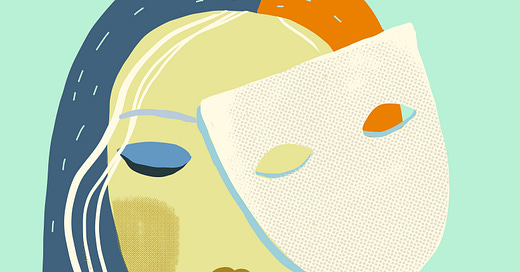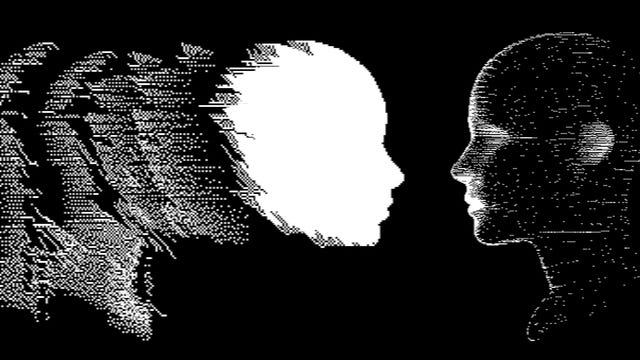When people aren't who they seem
It took me years to learn to trust my gut and set healthy boundaries.
Welcome to my weekly newsletter building a supportive community for Highly Sensitive People (HSPs).
It’s a mistake I’ve made more than once, and it’s taken me years to learn my lesson.
The pattern would go something like this:
I’d meet a new person and have an instant gut feeling that something was off.
But this new acquaintance would be so attentive that I’d over-ride my instinct and start getting to know them.
By the time I’d realised that all was not what it seemed, I may have gone through months of stressful interactions, walking on eggshells, confusion and self-doubt.
I’ve been lucky in that I’ve repeatedly managed to extricate myself without suffering lasting harm. But coaching Highly Sensitive People, I’ve seen how much distress such enmeshments can cause, and how the ripple effects can impact many other people.
Red flags should go up when friends, partners, relatives, colleagues, neighbours or people in our communities consistently leave us feeling:
Dominated
Controlled
Not listened to
Confused
Drained
Not ourselves
Frustrated
On edge
Criticised
Devalued
Demeaned
Undermined
Reading that list, we might ask ourselves why we would spend more than a minute with anyone who made us feel that way. But we may not have a choice — particularly if such people are our relatives. Or they may arrive in our lives in a kind and caring disguise. In any case, the theme that comes up again and again in my coaching work is how subtle the suite of manipulative behaviours can be.
As HSPs, we’re particularly vulnerable. Our empathy, people pleasing tendencies and desire to see the best in people are wonderful qualities — but they can also blind us to the more shadowy aspects of people we meet (and the shadows at work in us). When dysfunction begins to show up, we may blame ourselves — or go into rescuer mode.
Waking up to the reality of our situation can take years. We don’t want to acknowledge the extent to which we’ve allowed somebody to chip away at our confidence or control us. And our sense of obligation, conscientiousness and compassion means it can take even longer for us to find the courage to put in the boundaries we need to break the cycle.
This is a huge area, and I plan to go into more depth in future editions of The HSP Revolution. This week, I want to start with some basics.
Suppressed pain
First, I want to acknowledge that this is a delicate topic. I have no wish to stigmatise people with high-conflict personality styles — which can be a result of suffering acute childhood trauma. Such people are often sitting atop a mountain of suppressed pain, and their primary method of self-regulation is to inflict that pain on others.
In many cases, the harmful behaviours are unfolding largely outside the perpetrator’s conscious awareness. That’s why they will often make such convincing protestations of innocence if ever they are confronted. Not only do such people have no real capacity for empathy or accountability, they don’t even realise they are suffering these deficits. Nobody would choose a life as emotionally barren as that.
I’m thinking particularly of people with narcissistic traits — whether in the overt, grandiose sense of the term, or in the more subtle “covert” form of narcissism, which is all about playing the victim. There are dangers, of course, with throwing labels around too lightly. Nevertheless, I have found these frameworks extremely helpful. (I highly recommend the excellent YouTube channel on narcissism by Dr Ramani Durvasula for anyone who wants to dive deeper.)
Whatever terminology you may wish to use, in my experience, HSPs are magnets for people who seek to assert control over others using manipulation, pity plays and outright bullying. The first step is to recognise that these personality styles exist — and that our blind spots can make it hard to see them coming.
A world of confusion
When I look back at the times I found myself involved with people who left me feeling stressed, anxious and confused, I can see some of the following patterns:
Something feels off — To anyone watching your interactions, the things they say, or the texts they send, might seem perfectly friendly and benign. But you can sense an intention behind the words that doesn’t feel right.
Always on the defensive — I’d often find myself having to apologise over some alleged slight — and internalise a sense of guilt for having let the person down. But this would never sit right with me. After days of turning events over in my mind, I’d realise that they had made an issue out of nothing purely to create drama, when in fact I’d done nothing wrong.
Fearing conflict — Without even realising I was doing it, I’d edit myself in conversation, or steer clear of certain topics, because of an unconscious desire to avoid the inevitable conflict I knew would erupt if I said what I really felt.
Blame-shifting — Every time I tried to start an honest chat, I’d end up feeling like I was in the wrong. They might talk about how they were on a path of personal growth — and that I should just give them a chance. My HSP desire to see the best in others would kick in, and I’d forgive them. But I’d soon learn that they hadn’t taken any responsibility, and I’d see no change in their behaviours.
Ulterior motives — At first, I’d feel the person was listening deeply as I opened up about my deepest thoughts and feelings — and I enjoyed the sense of connection. It was only later that I’d notice that they had started to adopt some of my interests and mannerisms — as if they were trying to acquire my character traits for themselves.
Who is this person, really? — There would always come a moment where I saw a glaring contrast between the image the person would project in public, and their behaviours in private. I’d be left wondering who they really were.
Projecting their disowned traits — If challenged, people with these personality styles will accuse you of exhibiting the very behaviours you have observed in them.
Feeling alone — As it gradually dawned on me that something was wrong, I’d feel very isolated. I wouldn’t want to share my concerns for fear I’d be seen as talking about somebody behind their back. If I did find somebody to confide in, they would often struggle to understand, and say things like: “She’s always seemed really nice to me” or “Everyone has off days — you should give them another chance.”
Difficulty breaking away — For a long time, I lacked the confidence to put in boundaries — and I’d feel a lot of self-doubt about cutting people out of my life. Moreover, people with these personality styles can be adept at finding ways to pull you back in — even after the mask has slipped.
Once we’ve seen the reality in one of these relationships, there is no way to unsee it — even if we may spend a long time in denial. It can be very tempting to beat ourselves up and ask “How could I have been so naive?”
Try to go easy on yourself. If there is one key message I’d have for anyone dealing with these kinds of entanglements, it’s self-compassion. In my experience, HSPs are particularly susceptible to getting involved with people who can hone in on our vulnerabilites, and undermine our confidence and trust in ourselves. It’s a lesson I’ve had to learn a number of times — and I’m still learning.
I also believe that learning to manage these relationships, and set healthy boundaries, are key steps to empowerment for virtually all HSPs. Supporting people to undergo that process in community is a big part of the reason I launched The HSP Revolution.
We’ve barely scratched the surface of this topic — and I’d love to hear about your experiences in the comments.
Until next week,






Thank you for this. I truly believed it was only me. I have felt very alone with this, in coping with my partner and his dysfunctional family over a number of decades. I have very much put myself in rescuer mode. Now I realise they don't want to be rescued, and I have worn myself out. I have recently put in boundaries to protect myself from any more hurt, and have the task of carving out a sustainable future relationship with them all. It's not easy. I am so thankful that this group is a safe space to talk about these issues.
I really enjoyed reading this post; in fact I couldn’t get off to sleep because it got me thinking about the subject of narcissism and ‘difficult people’ in general.
I have also enjoyed the insightful work of Dr Ramani Durvaula and have read most of her books, never have I experienced such a succession of light-bulb moments!
Before I discovered Ramani I had my blind spots, these days I keep toxic people at arms length, my BS radar is always on, I block people on social media and my boundaries are strong. I still feel the fire in my belly, but I’m working on my anger and finding the space between stimulus and response for a healthy outcome. Dealing with difficult people is a hard work and I’m careful to pick my battles.
Even though Ramani is a Psychologist and Councilor she explicitly warns about the crazy making manipulative and charismatic nature of the narcissist. They gaslight and victimise making you think you are the one with a personality disorder.
In my experience a controlling person with issues will only bring you down, you can’t bring them up to your level! You might think they have dubious morals and values but they are most likely happy and confident in their own skin with an inability to self-reflect. Can you imagine Trump or Putin self-reflecting! Just to illustrate I had one incredibly difficult boss that enjoyed playing mind games and pitting us against each other, he used his money to seduce naïve individuals. I’m glad to say he got his comeuppance for his crime and was named and shamed on the TV then locked up for a couple of years. I also have many funny anecdotes about other individuals who harbor ‘dark triad’ traits; sometimes you have to pity these characters!
I would say trust in your gut instincts and intuition; you might be spot on with your prejudgments. Don’t be naïve be mindful that they might not be who you think they are and walking away from toxic people and cutting them out of your life is an act of self-care.
People either inspire you or drain you – pick them wisely